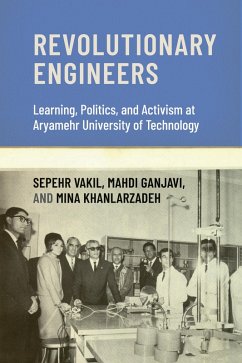The cultural, political, and pedagogical history of an elite Iranian engineering institution in the years directly preceding the 1979 Iranian revolution. In 1966, the Shah of Iran established Aryamehr University of Technology (AMUT), now known as Sharif University of Technology, as part of a larger campaign to modernize the nation. In 1979, AMUT engineering students played a critical role in the revolution that overthrew the Shah and his regime. In Revolutionary Engineers, Sepehr Vakil, Mahdi Ganjavi, and Mina Khanlarzadeh show how Western notions of scientific and technical rigor combined in unexpected ways with Iranian and Islamic values at AMUT in the years directly preceding the 1979 Iranian revolution. They also argue that global perspectives, particularly from the Global South, can deepen and complicate contemporary discussions on ethics, epistemology, and knowledge production in STEM fields. The authors present the cultural, political, and pedagogical history of AMUT, from its 1966 establishment up to its pivotal role in the 1979 revolution, while delving into the complex interplay of global, national, and Islamic values in STEM education. In the past several years, STEM education scholars have challenged the epistemological and ontological foundations of STEM education research and practice, while deepening the field's engagement with questions of power, ethics, race, and justice. The case of AMUT presents the opportunity to contribute a Global South perspective to studies of the civic, cultural, and political functions and foundations of science and engineering education. Sharif University continues to be at the epicenter of politics in Iran.
Dieser Download kann aus rechtlichen Gründen nur mit Rechnungsadresse in A, B, BG, CY, CZ, D, DK, EW, E, FIN, F, GR, HR, H, IRL, I, LT, L, LR, M, NL, PL, P, R, S, SLO, SK ausgeliefert werden.









